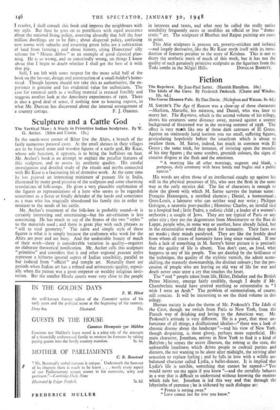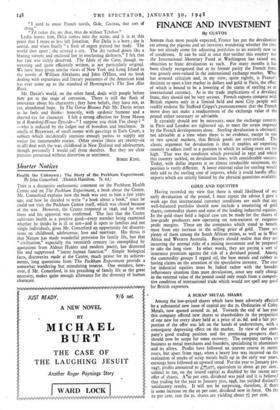Fiction
The Reprieve. By Jean-Paul Sartre. (Hamish Hamilton. 10s.) The Gorse Blooms Pale. By Dan Davin. (Nicholson and Watson. 8s. 6d.)
M. SARTRE'S The Age of Reason was a close-up of three characters —Mathieu, Marcelle, his mistress, and Daniel, who was later to marry her. The Reprieve, which is the second volume of his trilogy, shows his creatures some distance away, massed against a stormy background of theatened war in the stewing summer of 1938. The effect is very much like one of those dark canvases of El Greco. Against an ominously lurid horizon you see small, suffering figures, gesticulating hopelessly before the cataclysm which is about to swallow them. M. Sartre, indeed, has much in common with El Greco ; the same trick, for instance, of insisting upon the muscles of his tiny figures ' • the same sombre, greenish colours, the signs of creative disgust at the flesh and the emotions.
" A morning like all other mornings, stagnant and blank, a pompous, daily ceremony with brass bands and bugles and a public sunrise."
His words are often those of an intellectual caught up against his will in the physical processes of life, who sees the flesh in the same way as the early mystics did. The list of characters is enough to show the gloom with which M. Sartre surveys the human scene : Francois Hannequin, a certified chemist ; Daniel, a homosexual ; Gros-Louis, a labourer who can neither read nor write ; Philippe Gresigne, a neurotic poet-pacifist ; Monsieur Charles, an invalid tied to a hospital bed ; little Pedro, a sadistic child ; a leader of a women's orchestra ; a couple of Jews. They are not typical of Paris or any other city ; they are the degenerates from Montmartre or the Rue de Lappe, people who, in some way or another, have already failed, but in the existentialist world they speak for humanity. Their faces are set masks ; their minds paralysed. They are like the freshly dead from Whom all traces of humanity have long since vanished, If one feels a lack of something in M. Sartre's bitter picture it is precisely that the quality of life is absent. You don't care, au fond, what happens to any of his people. You-are dazzled by the brilliance of the technique, the quality of the stylistic varnish, the adroit scene- shifting, the masterly showmanship, the distinct colours ; but the pro- cession of people who are leaving an old way of life .for war and death never once utter a cry that touches the heart.
The " real " people taken from life, Hitler, Daladier and the British Prime Minister, emerge fairly credibly, though I doubt if Mr. Chamberlain would have uttered anything so existentialist as " I wish I were an Arab." The problem of existentialism, of course, still remains. It will be interesting to see the third volume in this trilogy.
Human society is also the theme. of Mr. Prokosch's The Idols of the Cave, though we switch from Paris to New York, from the French way of drinking and loving to the American way. Mr. Prokosch's attitude is very different. He is a poet, that most un- fortunate of all things, a disillusioned idealist—" there was a look of chronic disease about the landscape "—and his view of New York, though despairing, is more glossy, perhaps more superficial. His main character, Jonathan, arrives in New York to find it a kind of Babylon ; he senses the secret illnesses, the rotting at the core, the unbearable loneliness which drives people to cocktail parties and dinners, the not wanting to be alone after midnight, the striving after sensation to replace feeling ; and he falls in love with a wildly un- balanced character called Lydia, a ballet-dancer. It is implied that
Lydia's life is terrible, something that cannot be named--" You would never see me again if you knew "—and she certainly behaves in a way that is difficult to understand without knowing the motives which rule her. Jonathan is led this way and that through the labyrinths of pretence ; he is sickened by such dialogue as: " France is rotting away."
" Love cannot last for ever you know." " I used to enjoy French novels. Gide, Cocteau, that sort of thing."
" I'd rather die, my dear, than do without Tchekov."
Lydia leaves him, Delia comes into the scene, and it is at this point that I more or less left Jonathan. For Delia is a bore ; she is unreal, and when finally " a flash of regret pierced her body. The world shot apart ; she uttered a cry. The sky rushed down like a blazing torrent and enclosed her in everlasting darkness," I felt that her fate was richly deserved. The Idols of the Cave, though in- teresting and quite efficiently written, is not particularly original. We have been given similar views of New York and Long Island in the novels of William Abrahams and John O'Hara, and no book dealing with expatriates and literary poetasters of the American kind has ever come up to the standard of Hemingway's The Sun Also Rises.
Mr. Davin's world, on the other hand, deals with people before they get to the stage of corrosion. There is still the flush of innocence about his characters ; they have beliefs, they have not, as yet, abandoned hope. In The Gorse Blooms Pale Mr. Davin writes as he feels and thinks : honestly, with sardonic humour and a shrewd eye for character. I felt a strong affection for Irene Mason in A Boarding-House Episode—" I suppose you think I'm cheap ? " —who is seduced by the lodger out of boredom and loneliness. It smells of Bayswater, of small rooms with gas-rings in Earls Court, a subject which incidentally contains enough pathos to supply any writer for innumerable stories. Other stories (there are twenty-six in all) deal with the war, childhood in New Zealand and adolescence, though personally I would call them sketches. But they are clear pictures presented without distortion or sentiment.
ROBIN KING.



































 Previous page
Previous page